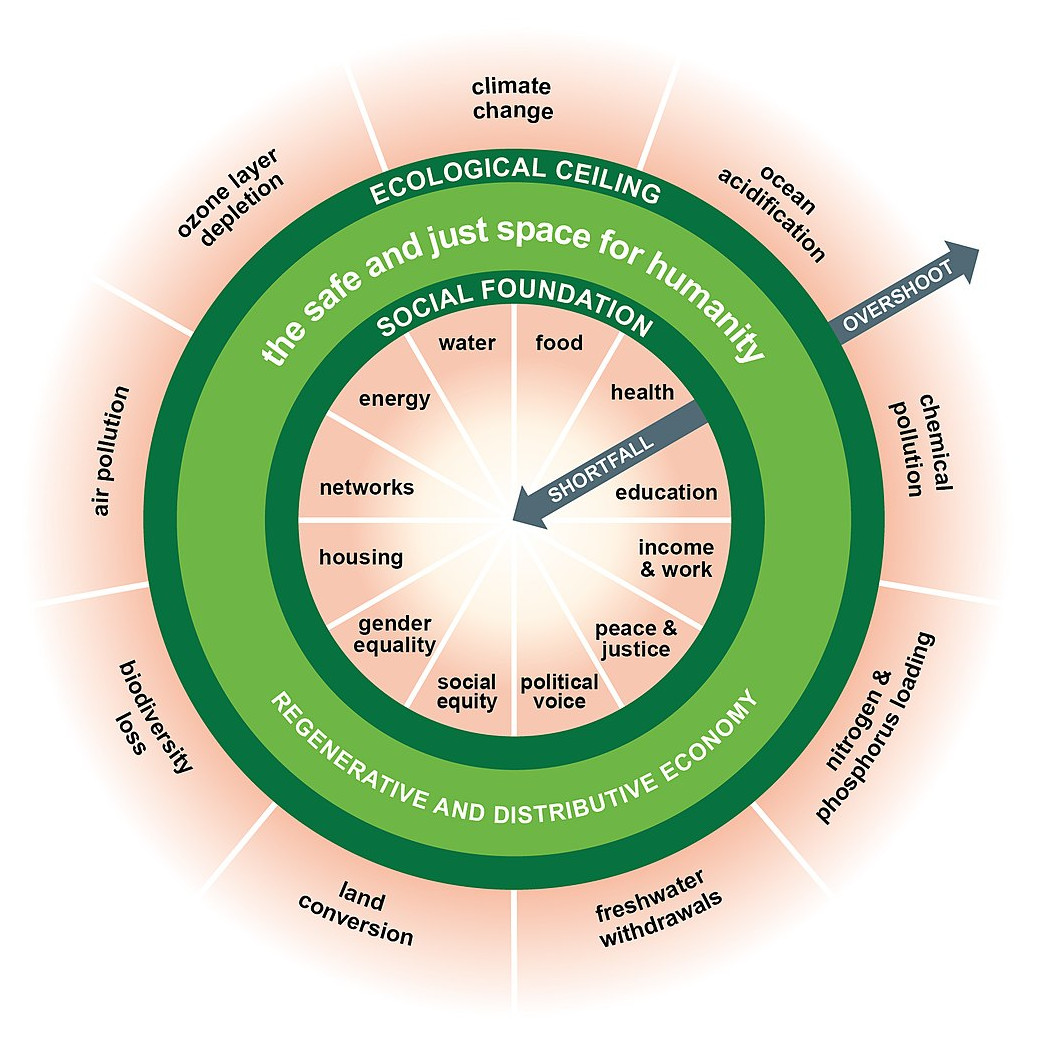Social Justice Computing
This October I will turn 62 years old, and the question of retirement, already a possibility, will be coming closer. Just how long I remain in the education game as an information and communication technology (ICT) teacher will depend for the most part on how directly doing so allows me engage in social justice computing.
What do I mean by "social justice computing"? In the broadest sense, it means that as an ICT professional I am able to use the tools of my trade toward the social justice aims that ought to be the central focus of all 21st century humans, aims which economist Kate Raworth presented graphically in her book Doughnut Economics: Seven Ways to Think Like a 21st-Century Economist:

At the very minimum, this means continuing both my decades long contribution toward the de-commodification of software as an activist in the free software movement, and the de-commodification of educational resources as a contributor of open educational resources (OER), but I'm hoping for more.
This year offers the further promise of being able to directly contribute towards next systems economic thinking through Code for NOVA's planned partnership with The Democracy Collaborative and the Next Systems Studies program at GMU, and my trip to Liberia this Summer is resulting in an emerging plan to engage a group of MCSS students in a social justice computing project aimed at their particular needs.
What Does Social Justice Computing Look Like in Liberia?
In Liberia, it is overwhelmingly the inner ring of Kate Raworth's doughnut that is of paramount concern, with the threat of a shortfall in meeting the barest minimum requirements of a viable social foundation constantly looming. For an ICT program here to be of any use to the people, it has to directly serve in the production and distribution of the food, clothing, shelter, medical care, education and other human needs of the people.
I came here specially to help my friend Isaac Zawolo ("the Supe" as he is affectionately called) build an ICT program within MCSS. Naturally, I am hoping to find a way to do this that promotes solidarity and is explicitly anti-imperialist (see Vijay Prashad: What is imperialism?).
Since desktop computers are very uncommon here, but mobile computing is practically ubiquitous, any useful ICT tool for helping address Liberia's needs will of necessity be mobile. I have long been aware of this reality, which holds in my wife's native El Salvador as well as it does here in Liberia. Yet as someone deeply committed to democratic computing, I resisted even getting a mobile phone until I could find one that ran free software, which for a long time was not really possible. The mobile landscape is dominated by the worst tech oligarchs, and freedom has been almost completely absent from the mobile landscape they have constructed.
If I want to help an ICT program in Liberia, however, I will need to fully embrace mobile, so it's time to dig in and find the best path forward.
A Mobile Platform for Democratic Computing
My search for a shared, democratic, participatory mobile platform has been a long journey.
Back in 2015 I jumped into the Firefox OS community, and would have happily remained there had the project not died (see Learning and Teaching Firefox OS and Mobile Happiness with Firefox OS!).
About a year ago I made a post about my switch to LineageOS on my daily use phone. That phone with that OS served me well, but events here in Liberia have just led me to reinstall Ubuntu Touch (UT) on it.
The following things led me to do this:
- Being here made me realize how important it is to have a FOSS mobile platform on which local developers in general, and my MCSS students in particular, could develop apps.
- One of the students in my afternoon "GT" class, Mulbah T. Kolleh, repeatedly asked me about the possibility of learning to create phone apps. He was really passionate about it, and as I always do when one of my students expresses that kind of passion, I set about looking into how we might do what he wanted to do.
- While LineageOS meets the requirements of being a free software mobile OS, it is a heavy weight system, requiring a big Java software development environment and a steep learning curve that would make it very challenging to use in the way I want to use it in Liberia.
- After some investigation into the level of activity in the UT community, I found it to be alive and kicking. When I came across Ubuntu Touch app development training, part 1, I realized that the barrier to entry was low and dedication to education was high, giving UT the same attributes that attracted me to Firefox OS. It is a light weight development environment that will run well on the older computers we have access to in MCSS, another huge plus.
So now I have a developing plan for how to move forward with the ICT educational program with the Summer MCSS students.
Things Are Coming Together in Week 5
Last Saturday the long awaited shipment of laptop computers arrived. MCSS has been officially on holiday Monday, Tuesday, and Wednesday for Liberia's Independence Day celebration, but Spencer and I came in on Monday to setup the lab with the new computers. With Spencer and I working together, we were able to setup the whole lab in half the time it would have taken me alone.
When students arrive to class tomorrow, they will find the lab transformed. The laptops are much newer computers than the old desktops they are replacing, and they will play sounds and connect together through the wireless network. They also take up much less space and make the lab look a whole lot nicer.
I'll take pictures of the new setup and share them in my next post.